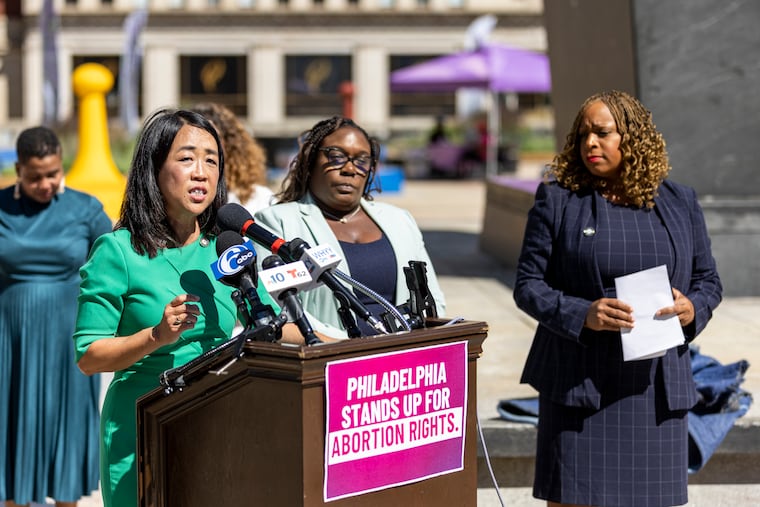Protections for abortion providers and patients get the OK from a Philly City Council committee
Despite the election of Democrat Josh Shapiro for governor, Councilmembers said the threat for those seeking or providing abortion in Pennsylvania persists.

Philadelphia City Council moved forward Thursday with proposals that would make it harder to sue patients and local providers under the laws of states that banned abortion and would protect abortion-seekers from workplace discrimination.
» READ MORE: Can abortion be legislated at the local level? The women on Philly Council are pressing for new protections.
A Council committee unanimously advanced three abortion-related bills that supporters described as necessary and cutting-edge, even after Pennsylvania voters this week elected a Democratic governor who vowed to defend access to reproductive health care.
In June, the U.S. Supreme Court overturned Roe v. Wade, the landmark abortion case that guaranteed a federal constitutional right to abortion. More than a dozen states have since banned or restricted abortion. In Pennsylvania, abortion remains legal up to 24 weeks of pregnancy, and beyond then if the pregnant person’s life is at risk.
Abortion was a key issue for Democratic voters in the midterm election, exit polls show. In his victory speech, Gov.-elect Josh Shapiro said “a woman’s right to choose won.” He defeated Republican Doug Mastriano, who has said that women who violate an abortion ban should be charged with murder.
As early as next spring, Pennsylvania voters could see on their ballot a measure to amend the constitution to state that there is no right to abortion.
“The reproductive rights of Philadelphians and those who choose to travel to Philadelphia for care remain under threat,” said Councilmember Kendra Brooks.
City Council’s Committee on Public Health and Human Services held the Thursday hearing on the trio of bills introduced earlier this fall by Brooks with Councilmembers Helen Gym and Jamie Gauthier.
“These bills are cutting-edge interventions,” said David Cohen, a law professor at Drexel University who is among the legal counsel for a Pittsburgh abortion clinic suing Pennsylvania over whether Medicaid should be required to pay for abortions.
For the last year, Cohen has been researching the legal issues that would come post-Roe. He said that he believes states that ban abortion will try to investigate, sue, or prosecute providers and patients in places like Philadelphia, which could become travel destinations for those seeking care.
Cohen, and others who testified, said that the proposed legislation would mitigate that threat. They noted that states like Texas have passed “bounty” laws that allow private citizens to sue for financial compensation anyone involved in an abortion.
The proposed legislative package in Philadelphia would:
Allow Philadelphians who face such a lawsuit to countersue in a Philadelphia court to get their money back.
Add privacy restrictions on sharing patient data related to abortion to prevent it from being used against Philadelphians.
Protect Philadelphia workers from discrimination in the workplace based on reproductive health choices, whether they are seeking abortion care or fertility treatment.
» READ MORE: Voters protect abortion rights in Michigan, California, Vermont, reject antiabortion amendment in Kentucky
“We cannot expect patients to seek reproductive health care or providers to render these services if they are constantly under threat of legal action or harassment,” said Gauthier.
David Oh, the sole Republican on the committee, voted in favor of the three bills but said he has questions about whether Council has the authority to enact the privacy protections and the countersuit measure.
Cheryl Bettigole, commissioner of the Department of Public Health, and Kia Ghee, executive director of the Commission on Human Relations, testified in favor of the bills.
Access to legal and safe abortion care improves health and social economic outcomes, Bettigole said. She noted that Philadelphia’s maternal mortality is above the national average and that the risk of death due to pregnancy is much higher than that of an abortion.
“These bills make a clear statement to the residents of our city that we value their privacy and right to make decisions about their health,” she said.